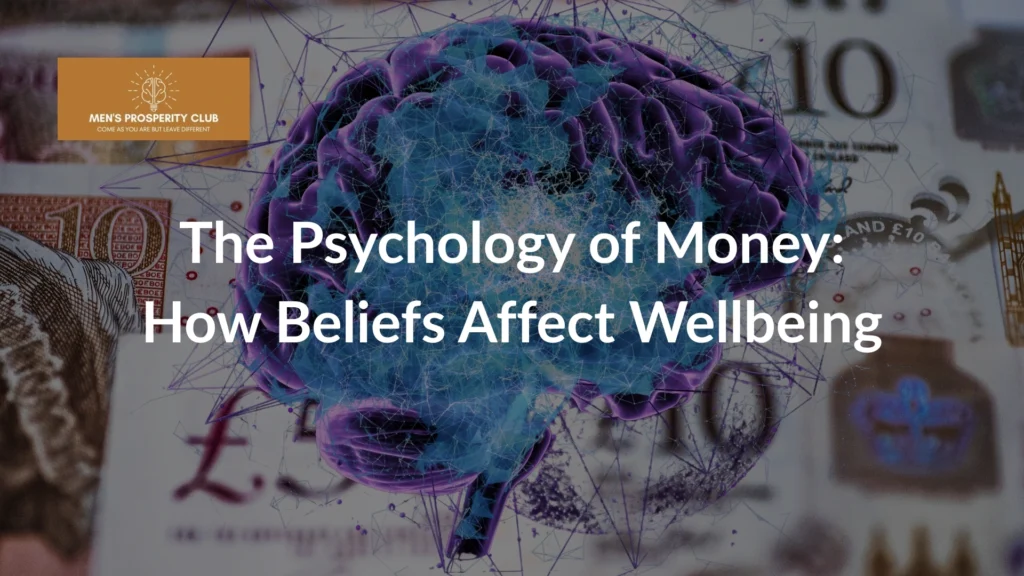When it comes to financial wellbeing, many people often assume it’s simply about how much money you have. While that’s undoubtedly important, the way you think about money is equally – if not more – crucial. This is where the psychology of money plays an important role. Our beliefs, attitudes and behaviours surrounding money can significantly influence our overall wellbeing. Whether you’re comfortable or struggling, understanding how money impacts your mental and emotional health is vital to living a more balanced, fulfilling life.
Understanding the Psychology of Money
The psychology of money is about recognising how your personal attitudes towards money shape your financial decisions and how those decisions, in turn, affect your mental and emotional wellbeing. From childhood, we learn a great deal about money from our parents, society and personal experiences. But these lessons don’t just inform how we save, spend and invest – they also shape our emotional responses to money, which can deeply affect our overall happiness.
Money doesn’t just exist as a number in your bank account or a wad of cash in your pocket; it’s tied to your sense of security, your lifestyle, and your identity. How you feel about money can influence everything from stress levels to life satisfaction, which is why exploring the psychology behind it is essential.
How Beliefs About Money Affect Wellbeing
Our beliefs about money – whether positive or negative – often influence our financial decisions. For example, someone who believes that money equals happiness may overspend to acquire material goods, believing that possessions will lead to contentment. On the other hand, someone who sees money as a source of stress or anxiety may avoid spending, even if it means missing out on experiences or opportunities for growth.
These beliefs can lead to a cycle of emotional highs and lows. If money is seen as a source of security, individuals may feel anxiety when they face financial challenges. Alternatively, if money is perceived as a means to achieve status, it may lead to constant dissatisfaction, as they may never feel they have enough to keep up with their perceived peers.

Financial Anxiety and Mental Health
One of the most common ways our beliefs about money can affect wellbeing is through financial anxiety. According to a study by the Mental Health Foundation, financial worries are one of the leading causes of stress in the UK. Nearly 6 in 10 people say that money problems have negatively impacted their mental health, with 2 in 5 reporting that financial concerns have caused them to feel anxious, depressed or overwhelmed.
This anxiety can stem from a variety of beliefs. For some, the fear of not having enough money creates a constant state of worry, making it difficult to enjoy the present moment. For others, the pressure to ‘keep up with the Joneses’ and maintain a certain lifestyle can lead to feelings of inadequacy and self-doubt. This psychological burden often manifests in physical health issues, including sleep disturbances, headaches, and even chronic illnesses, making it a vicious cycle that can be hard to break.
The Power of Money Mindset
The way we perceive and approach money is known as our “money mindset.” A healthy money mindset can empower us to take control of our finances and reduce stress, while a negative mindset can fuel anxiety, avoidance and financial instability. But the good news is that money mindset is not fixed – it can be changed with conscious effort and practice.
Fixed vs. Growth Money Mindset
According to financial expert and author of The Psychology of Money, Morgan Housel, people generally fall into one of two categories when it comes to their approach to money: a fixed mindset or a growth mindset. People with a fixed money mindset often believe that their financial situation is determined by factors beyond their control, such as fate, luck, or their upbringing. As a result, they may avoid taking risks or feel stuck in their financial situation.
On the other hand, people with a growth mindset see their financial situation as something they can improve through effort, learning and making better decisions. They are more likely to take proactive steps to improve their financial situation, whether through budgeting, saving, or seeking investment opportunities. This approach often leads to better financial outcomes and, as a result, greater emotional wellbeing.

Money, Identity and Self-Worth
Another significant factor that ties the psychology of money to wellbeing is the link between money and self-worth. For many men, especially in the UK, financial success can be strongly tied to their sense of identity. From an early age, we’re often taught that financial success is a reflection of our hard work, intelligence and ability to provide. This societal pressure can lead men to equate their self-worth with their income and possessions.
But this isn’t always healthy. When financial setbacks occur, it can lead to a crisis of identity, where the individual feels like they’ve failed not just financially but also personally. This can lead to feelings of shame, guilt and depression, further compounding the negative impact money has on wellbeing.
Changing this mindset requires reframing how we view money and its role in our lives. Money should not define your worth or measure your success. Instead, it should be viewed as a tool that enables you to live the life you desire, not as a measure of personal value.
The Role of Financial Planning in Wellbeing
One way to improve your psychological relationship with money is through effective financial planning. Having a clear plan for managing your money can help reduce uncertainty and stress. When you have a structured approach to your finances, you are better able to weather financial storms, make informed decisions and achieve your goals.
Setting clear financial goals – whether it’s saving for retirement, purchasing a home or paying off debt – provides a sense of control and direction. This sense of control can significantly improve your mental and emotional wellbeing. In fact, research from the Money and Mental Health Policy Institute suggests that having a financial plan can reduce the mental strain associated with financial uncertainty.
Moreover, practising mindfulness in managing finances can also be beneficial. This involves staying present with your money decisions and avoiding the temptation to make impulsive financial choices that may lead to regret later.
Positive Practices to Improve Your Money Mindset
To improve your psychology around money and ultimately enhance your wellbeing, try incorporating these practices into your routine:
1. Educate Yourself About Money
One of the most empowering things you can do is to increase your financial literacy. Understanding how money works, how to manage it, and how to grow it can eliminate the fear of the unknown. The more informed you are, the more confident you’ll feel in your financial decisions.
2. Set Realistic Financial Goals
Setting clear, attainable goals will give you something to work towards and create a sense of accomplishment. Break down large goals into smaller, manageable steps and celebrate each victory along the way.
3. Reframe Your Thoughts About Money
Try to shift your perspective from seeing money as a source of stress to viewing it as a tool that helps you live the life you want. Recognise that money is a means, not an end, and it’s the experiences and people that matter most.
4. Practice Gratitude
Instead of focusing on what you don’t have, practice gratitude for what you do have. This shift in mindset can foster a sense of abundance, which can reduce financial stress and improve your overall sense of wellbeing.
5. Seek Professional Guidance
If you’re struggling with your finances, consider seeking the help of a financial advisor or therapist. Professional guidance can help you develop healthier money habits and provide support during difficult financial times.

Final Thoughts: Transforming Your Relationship with Money
The psychology of money is an essential but often overlooked aspect of financial wellbeing. Our beliefs about money shape our behaviours and can have a profound impact on our mental health. By understanding the psychological factors that influence our relationship with money, we can take steps to improve our financial habits and, ultimately, our emotional and mental wellbeing.
Changing how you think about money isn’t an overnight process, but with effort and intention, it’s entirely possible. By cultivating a positive money mindset, setting realistic goals, and reframing your thoughts about money, you can reduce financial anxiety, boost your confidence, and create a healthier, more fulfilling relationship with money – one that enhances both your financial and mental wellbeing.
How Men’s Prosperity Club Can Help
If you’re struggling to break free from the stress and anxiety associated with money, Men’s Prosperity Club is here to guide you. The platform offers tailored financial coaching and resources specifically designed to help men like you overcome financial challenges and develop a healthier mindset towards money. By working with experienced coaches and joining a supportive community, you can gain the tools and strategies to improve your money management, set achievable financial goals and reduce the mental strain that often comes with financial uncertainty.
Men’s Prosperity Club focuses on building a strong foundation of financial literacy while also addressing the emotional and psychological aspects of money. Whether you’re looking to create a budget, plan for your future or simply shift your perspective on wealth, their services offer the guidance and support needed to help you thrive both financially and emotionally.
If you’ve tried these strategies and still feel like money is controlling your life, consider reaching out to a financial coach or therapist. They can help you dive deeper into your money beliefs and guide you toward a more balanced and healthy approach to managing your finances.
If you’ve tried these strategies and still feel like money is controlling your life, consider reaching out to a financial coach or therapist. They can help you dive deeper into your money beliefs and guide you toward a more balanced and healthy approach to managing your finances.




